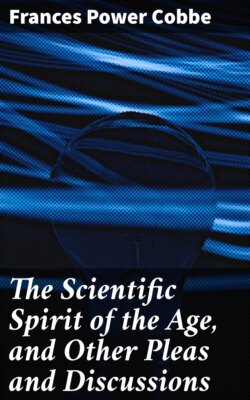Читать книгу The Scientific Spirit of the Age, and Other Pleas and Discussions - Frances Power Cobbe - Страница 3
PREFACE.
ОглавлениеWe are all possessed of friends who, when any serious belief or matter of practical conduct is in question, take up at the outset a thesis of their own which they press on our acceptance with the best arguments at their disposal. It is a rarer privilege to enjoy the intercourse of one who does not invariably start with a ready-made opinion of what may be true, right, or expedient in the doubtful case on which we wish to consult him, but who will patiently turn over the matter with us, suggest and register the various “pros and cons,” refer to admitted principles and facts, and thus aid us to form a comprehensive judgment for ourselves rather than induce us to accept his own. The discourse of the first order of friends is an Argument, a Plea, a Contention; that of the second, a Discussion.
In the same way, of course, an Essay may be either a Plea or a Discussion. The author may take the position of Counsel for one side or other of the case before the reader, or else he may charge as Judge, and sum up the substance of such arguments as might have been used by two advocates on the opposite sides. Either style of writing is perfectly legitimate; and each has its particular fitness and utility. Misunderstanding and perplexity only occur when the hasty reader (newspaper critics being signally guilty in this matter) chooses to assume that an avowedly one-sided Plea is intended for a Judicial Discussion,[1] or treats a Discussion as a Plea for the side which the critic dislikes.
In the present little collection of Essays, written at various times and for various objects, it will be found that the first three belong to the class which I have described as Pleas, and the last three more or less to that of Discussions.
I plead that the Scientific Spirit of the Age, while it has given us many precious things, is, in its present exorbitant development, depriving us of things more precious still.
I plead that the Education of the Emotions (to be carried on chiefly through the contagion of good and noble sentiments) is an object of paramount importance, albeit nearly totally ignored in ordinary systems of education.
I plead that, in the present disintegration of all religious opinion, Judaism may yet become a progressive, and cease to be merely a tribal, faith; and that, if it absorb the moral and spiritual essence of Christianity, it may solve the great problem of combining a theology consonant to modern philosophy with a worship hallowed by the sacred associations of the remotest past.
In the last three Essays, I discuss the relation of Knowledge to Happiness; I discuss the real—as distinguished from the conventional—character of our common processes of Thought; and, finally, I discuss the respective claims of Town and Country Life to be esteemed most healthy and felicitous for body and mind.
I shall much rejoice if I win my readers to adopt the opinions which I have advocated in the first half of the book.
I shall remain altogether indifferent as to which of the alternative views put forth in the concluding Essays may seem to them most impressive, and only congratulate myself if I shall have succeeded in setting forth in due light and order the multitudinous points which together constitute the materials for forming a sound judgment upon them.
Frances Power Cobbe.
Hengwrt, Dolgelly,
1888.
